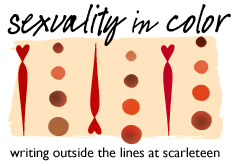 Time for another installment of our first-person profiles of queer people of color, this one from a young man who talks very candidly about being on the down-low, masculinity and race.
Time for another installment of our first-person profiles of queer people of color, this one from a young man who talks very candidly about being on the down-low, masculinity and race.
Again, even if you’re not of color and queer, not LGB or not of color, we think it’s so important to cultivate an awareness of what it means to be not just a member of one of those groups, but of both. If you are queer and of color, what we’re hoping this new series can do is help illuminate some of your own diversity, allow you to feel less isolated and know you’re not alone. Queer youth (and queer people on the whole) are often isolated. That isolation hurts and can and does do very real damage. LGB young people who are also oppressed, marginalized and rendered doubly invisible because of race tend to face even greater challenges and isolation.
No matter who you are or what your deal is, we think you’ll find these profiles challenge many perceptions and may make you reconsider or refine ideas or questions about orientation and race. We’d be lying if we didn’t say it also helps you and others grow your compassion and your care, better understanding that every kind of marginalization and oppression both does very real harm and always has the capacity to do so, especially if it goes unseen and unheard.
Maalik, 19
Color/race you are/identify with: Black American
When did you realize you were gay, lesbian or bisexual? I’ve known that I am attracted to men* for as long as I can remember. I identify as a MSM or as “downe”external link, opens in a new tab rather than as bisexual.
How did you feel about that realization? Being attracted to men didn’t bother me as much as how that attraction would play out. There aren’t many black MSMs [men who sleep with men] in the media so it was hard for me to reconcile my race and my masculinity with my attraction to men. I felt as though I would be seen as weak or effeminate by others.
Have you been able to come out? I have friends I know through local queer groups that I am “out” to. The process was fairly easy because of how I met them. Personally, it’s been difficult openly sharing this part of my identity - one that I keep a secret by choice - and feeling masculine despite that openness.
In my community, it’s not same-gender attraction that is looked down upon, it’s being open about that attraction. “Real” men can do whatever they want behind closed doors as long as the front they give to society is one of traditional heterosexuality. So telling others about my attraction somewhat diminishes my standing in my community.
That said, for me being “closeted” is as much a personal decision as it is one influenced by society. Being attracted to men isn’t a big deal and I don’t feel the need to build a big identity around it.
How supported do you feel by your own family and your community of color? My attraction to men is like an open secret in my family. Everyone understands that it’s there, but we don’t acknowledge it– anyone can be attracted to men, but being Gay (socially, politically, etc. involved in the GLBT community) is a white thing. My family doesn’t like it, but they accept it and they are supportive.
How about by the queer community? I’m not very much involved in the mainstream queer community. I go to parties with other MSM of color where I’m just another guy.
How has managing your romantic/sexual relationships gone? In what, if any, ways do you feel being a GLB person of color has impacted your relationships? I don’t have romantic relationships as a result of my attraction to men. I regularly have sex with men, but I have no desire to be in relationships with them for a number of reasons. Even though I am polyamorous, I wouldn’t want to be in a relationship with a woman who isn’t aware that I have sex with men. Instead of telling a potential partner– which is an affront to my identity– I’d rather just not date.
What do you feel are particular challenges for gays, lesbians and bisexuals of color? I think the biggest challenge is educating the mainstream queer community about the different experience of people of color. For example, I am not a closeted bisexual, I am a MSM whose identity includes nondisclosure. In the mainstream community this doesn’t make sense, but a lot of black MSMs understand that experience.
Does one kind of bias you face – racism vs. homo/biphobia – feel larger, more oppressive than the other? Can you talk about how? Racism is definitely a more oppressive force for me. Certainly, there are a lot of people who would be physically abusive if they knew of my attraction to men, but I have the freedom of choosing whether or not to disclose. With racism, my skin is like a marker of who/what I am and there’s no way around it. Also, I am seen more threatening as a black man than a MSM, therefore institutions are more oppressive towards me. When hanging out with gay-identified friends, I’ve never been around followed in a store, when hanging out with other brothas it happens regularly.
Want to be part of this series and share your experiences and ideas about being gay, lesbian or bisexual and of color? We’d love to include you and get your voice out there. Drop us an email and we’ll send you the questions!
